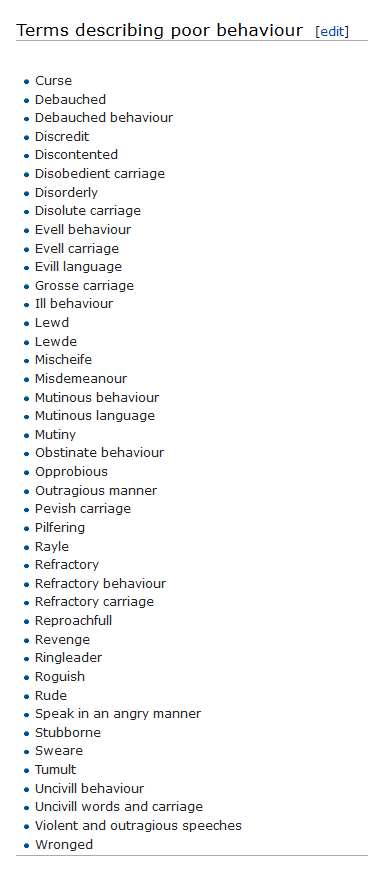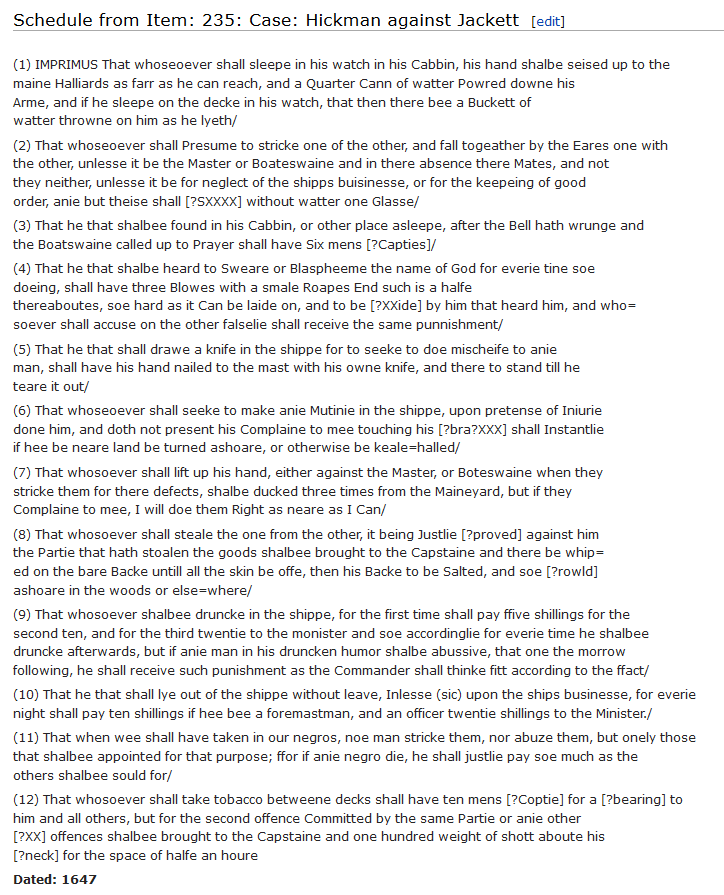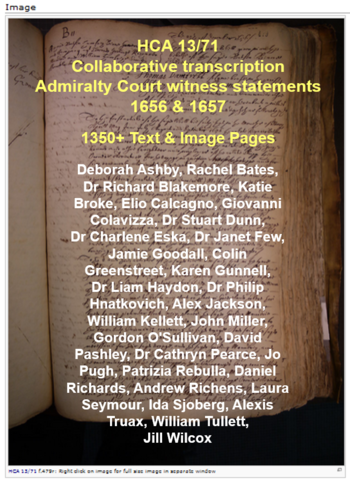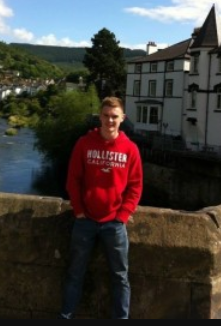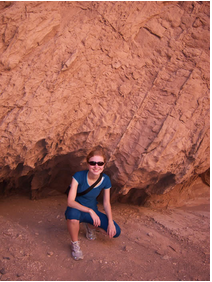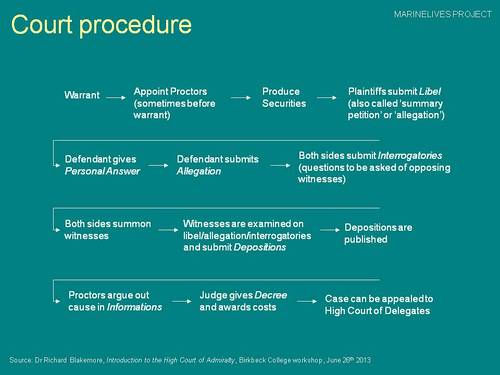MarineLives
Contents
Welcome to the MarineLives project
The MarineLives collaborative public history project was established in 2012 to digitise, transcribe and annotate the manuscript records of the English High Court of Admiralty from the 1650s and 1660s. The original records are held at the National Archives in Kew.
The project is led and advised by academics and members of the general public.
In the last three years project volunteers have transcribed over 3 million words and 6000 pages of Admiralty Court records.
To learn more or to volunteer please contact us
History skills training
We are kicking off our latest MarineLives history skills programme this coming week. The programme lasts nine weeks, and will be facilitated by Colin Greenstreet and Dr Philip Hnatkovich. We have have two places free and can take applicants until Friday October 16th, when the list closes.
The programme teaches participants how to read, transcribe and understand historical manuscripts. It requires one and a half to two hours of time per week from each participant. We will have one group of participants, co-facilitated by Colin and Philip. There will be weekly group Skype calls, and 1:1 support for individuals during the week as they work through well structured teaching material. Everything is done via the web. Think Harvard HBX but designed for History.
It is a great opportunity for university students at undergraduate and graduate level to acquire research skills and to learn about digital history; it is also an opportunity for high school students (seventeen and eighteen) to see what digital history looks like, as they think about and develop their interests; finally it is an exciting way for students considering a career in galleries and museums to learn about innovative approaches to public outreach. For testimonials see our team based transcription programmes.
We have trained over one hundred volunteers in the last three years, and have had success with seventeen year old high school students, with mariners who spent their careers on the sea, and with retired administrators returning to their first love. Confirmed participants in this autumn/fall's programme include three second year undergraduate historians at the University of Bath Spa, a former television producer, who worked on the history programme TimeWatch and on BBC drama, and a high school student based in San Francisco, who has a passion for history.
The programme uses a wiki based platform, on which we display manuscript images as well as transcriptions. The platform was designed by a volunteer, who works as an applications developer for a major business media company.
The agenda for the first group Skype call is here.
During the nine weeks we are going to be working on witness statements made in the English Admiralty Court in 1653 in a series of cases concerning the seizure by the English of silver bullion in three "Silver Ships" (see The Silver Ships research project).
The transcriptions we do will provide direct input into two initiatives we have concerning the Silver Ships: (1) An academic book, to be published in mid 2017, and to be written in 2H 2016 (2) a proposed television or radio series concerning the Silver Ships. There will be opportunities for all programme participants to interact with a freelance television writer during the nine weeks and to contribute ideas and research.
The programme is free of charge. In return we expect your commitment of one and a half hours to two hours of your time per week (scheduled as you wish). Your transcription work during the programme will be published directly on our wiki (with editorial support), ensuirng that you leave your own mark on history.
If you would like to learn more and take one of the two remaining places on this exciting programme, contact us now using our contact form.
The Silver Ships research project
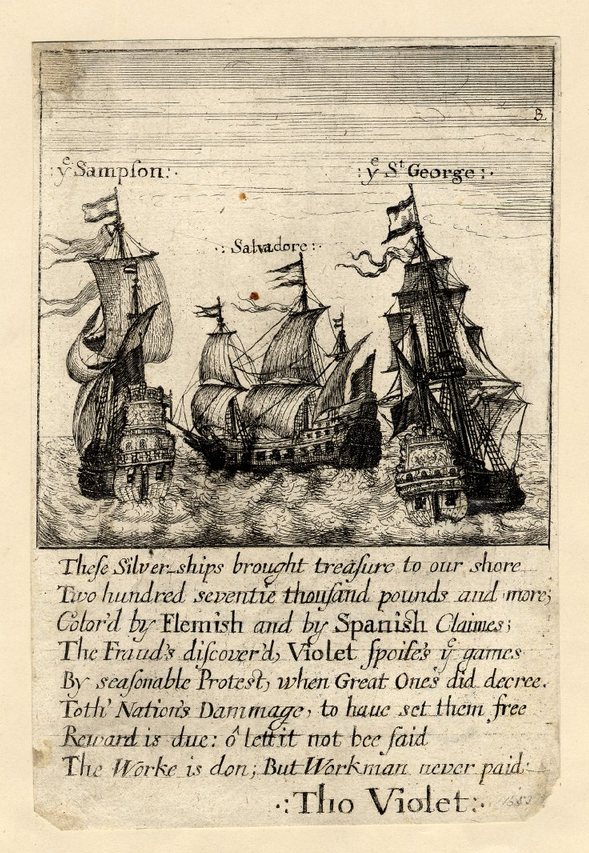
Three large ships (The Salvador, the Sampson and the Saint George), of supposed Lubeck and Hamburg build and ownership, were captured by the English in 1652 with highly valuable cargos of silver bullion.
The ships were on their way from Cadiz with bullion from the Spanish West Indies going northwards. It was disputed in the English Admiralty Court as to whether the ships were bound legally for the Spanish Netherlands, or illegally for Amsterdam.
The case was endowed with political as well as commercial weight - the Commonwealth, and then the Protectorate, was keen to have the bullion declared lawfull prize, but the Spanish government contested this.
The many and varied court depositions and other English Admiralty (and English and Spanish State Paper) records give very granular and highly colourful accounts of Seville and Cadiz, Hamburg and Lubeck, the Spanish Netherlands, the by-ways between the Spanish Netherlands and Amsterdam by which bullion could be smuggled overland and by canal, and the River Thames, where the ships and sailors were held following seizure.
Thomas Violet, a rather dodgy goldsmith, was involved as an agitator on behalf of the State, and published a pamphlet pleading for reimbursement of his efforts, which supplements the Admiralty Court material on the MarineLives wiki.
The Silver Ships project is being run by participants in the MarineLives 2015 summer transcription training programme.
Click to read more about the Silver ships and the historical and legal context of the resulting disputes.
Curses, debauchery, mutiny and revenge
Seventeenth century seamen of all nationalities were a boisterous lot, especially when "in drink". We have had some fun collecting some of the words used to describe poor behaviour, together with some of the rich language used amongst seamen.
We invite you to read about the Danish general's captain who told an English master of a ship that hs letters of marque were "good for nothing but to wipe his breeche with" (HCA 13/72 f.218v) and another English master who was alleged "in an outragious manner" to have reviled the merchants' factor calling him "old Roague and old Pedler and old Pimpe and the like disgracefull names" (HCA 13/73 f.3r)
For more examples click here.
Take a look too at a disciplinary code drawn up in 1647 by the master of the Mayflower, an English ship engaged in the slave trade.
Our readership
Our new MarineLives wiki went live on Wednesday May 27th. The wiki has 19333 pages and 8201 manuscript images.
In the last thirty days we have had 913 users, 1126 sessions, 2519 page views and six active contributors. A user in an average session looks at 2.2 pages in a session lasting two minutes sixteen seconds.
Since launch of the MarineLives wiki we have had 4935 users, 6080 sessions and 16472 page views. A user in an average session has looked at 2.7 pages in a session lasting two minutes and twenty-five seconds.
Since we launched our beta of the MarineLives wiki on April 20th 2015 we have had 5568 users, 6832 sessions and 18309 page views. A user in an average session has looked at 2.7 pages in a session lasting two minutes twenty-two seconds.
Our latest transcription challenge
HCA 13/124 is a volume of Personal Answers submitted in the English High Court of Admiralty in the years 1650 to 1652. The original manuscripts are held at the National Archives, Kew, England.
A complete set of digital images is available on this wiki, together with transcriptions of the first eighty six folios.
We are currently looking for volunteer transcribers to work with us to finish the transcription of this volume. Volunteers will be supported by an experienced trained facilitator. Novice and experienced transcribers are equally welcome.
Please contact us to learn more about working as a volunteer to complete HCA 13/124.
Introducing our content
HCA 13/71 is a volume of witness statements or depositions submitted in the English High Court of Admiralty in the years 1656 and 1657. The original manuscripts are held at the National Archives, Kew, England.
This volume was transcribed between September 2012 and March 2013 by a team of volunteer transcribers working on the MarineLives project. Full text semi-diplomatic transcriptions of the full volume are published on this wiki with associated digital images from the original manuscript volume.
Click here to access the text and images
Click here for an alphabetical list of deponents
Click here for a geographical list of deponents
Our team based transcription programmes
We run regular team-based transcription programmes on-line, facilitated by trained team leaders, with teams of three or four volunteer associates. These programmes last twelve weeks, and will take a transcriber from a novice to a confident transcriber in that space of time.
Please contact us to discuss volunteering, or to explore how we might work with your University, School or Local History Society.
Thomas Davies is a third year history undergraduate student currently studying at Bath Spa University. In the summer of 2014, Thomas was a member of a four person virtual team of volunteers transcribing Admiralty Court witness statements from 1658 to 1660, facilitated by Dr. Philip Hnatkovich in Pennsylvania:
"There were some challenging aspects of the programme — the main being distance. This was because we worked as a team and half of the team were based in the United Kingdom and half were based in the United States, so we had to be aware of time differences and that we would be unable to meet in person.
To combat this we used email, Google Hangouts, and Skype and made good use of all the resources available to stay in touch when working on the documents together. We had weekly calls to discuss team business. The weekly calls helped because we would talk about the problems or issues we faced weekly and how the transcriptions were to be presented covering topics such as layout or abbreviations.
The biggest challenge I faced in the transcription itself was becoming accustomed to the peculiar writing and distinguishing letters. Some letters look very similar, such as f’s and s’s, r’s and c’s not to mention t’s and l’s. I began transcribing effectively by taking it slow and working out the letters individually instead of looking at the word as a whole as we do with modern writing. I found this approach to be very effective.
MarineLives created a Bath Spa student section that helped me significantly, showing templates of letters and the different forms they have. This allowed me to tackle the many different writing styles the clerks used. Once I was able to distinguish between letters more clearly with considerable practise, I found I could transcribe enough of the page to get a good idea of what was being said in the documents. Then, I could alter words that did not fit within the context of the deposition, or using the context as a guideline as to what certain words should be."
Katherine Parker is a Ph.D. candidate at the University of Pittsburgh. She is currently writing her dissertation entitled “Toward a more ‘perfect knowledge': British geographic knowledge and South Seas exploration in the eighteenth century. She participated in the MarineLives Ph.D. forum in 2013, and the MarineLives summer programme in 2014:
"On summer research trips to London in 2011 and 2012, I had looked at a few HCA documents and knew that the cases recorded in them offered rich material for social, economic, and naval history. Over the course of several skype meetings, I and other PhD students got to give our opinions about the proposed platform and methodology for transcription. Working with a team created a strong community aspect to the project from the beginning; I have always been impressed by the inclusiveness and openness that drives MarineLives. Also, it was refreshing to have my opinion valued as a PhD student, as sometimes that stage in one’s education is isolating and transitional—you are not yet qualified as an expert, but also not unknowledgeable about certain fields.
The value MarineLives placed on the voices of the PhD forum made me want to participate further, even though the works being transcribed were not strictly within the chronological bounds of my dissertation project. Thus, when the summer transcription project was created, I jumped at the opportunity to use paleographic and transcription skills I had gained after a year in London archives on a Social Sciences Doctoral Dissertation Fellowship (2013-14).
Writing styles change over time, just like clothing and furniture styles. Thus, the letters inscribed within HCA volumes from the mid-seventeenth century posed a challenge for me, as I am used to the fluid, upright cursive (often written by a trained scribe or clerk) of the mid-eighteenth-century Admiralty. I came to enjoy the challenge of squinting at the digital pages in front of me, willing the words to make sense, filling in paragraphs slowly until suddenly they all made sense."
The Court records
Click here for full listing of Admiralty Court records within scope of MarineLives project
The English High Court of Admiralty produced a wide range of documents.
The various steps in a particular case can be followed in summary form in the Acts of Court.
A case was commenced with the issuing of a Warrant by the Court, and the preparation of a Libell or an Allegation by the party commencing the case.
Prior to witnesses being called to make their depositions, the defendant or "respondent" might make a Personal Answer in response to the Libell or Allegation.
The most accessible of the court records are the statements made by witnesses, which are called Depositions. These depositions were in response to written Interrogatories, which were prepared by both plaintiffs and defendants in a case.
Various written documents were submitted by plaintiffs and defendants, as well as witnesses, during a court case. Some of these have survived as loose documents in the Instance Papers.
Many cases were settled prior to the giving of a formal verdict or Sentence. For those cases which went to sentence, the sentences can be found in document bundles. These bundles often include bills of expense related to the case, and in some cases include copies of the allegations or libells, and other miscellaneous documents.

